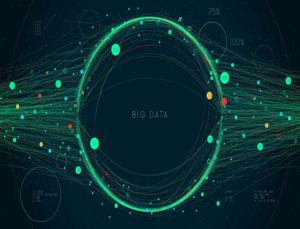
Big data is a term that refers to very large data sets. These data sets have the potential to contain so many seemingly unrelated pieces of information that it would be nearly impossible for someone to look through it all and find anything useful without advanced tools at their disposal.
Big data has become an integral part of marketing departments. Marketing managers are using big data software programs and analysis to learn more about consumer habits, both online and offline, which leads to more targeted approaches in advertising those products. This allows marketers to get their message out more frequently and much more effectively than before.
Many experts say that 2012 was the year of big data because companies realized how critical the analysis is in helping them make decisions on how they spend money on marketing their products.
It is also important to note that big data isn’t just for the next few years; it’s here to stay, and companies will have to adapt as time goes on. Traditional forms of advertising will become less effective because consumers grow tired of seeing the same ad repeatedly, and using different criteria to target them is much more difficult than it used to be according to Remote DBA.com.
The big data software market should see strong growth in 2012, with revenue expected to increase by 33% compared with 2011 figures. SaaS (software as a service) is one of the key drivers behind this growth, offering low entry costs, which allow even small businesses access to sophisticated analysis tools they would not have been able to afford otherwise. The markets leaders are IBM Corp., SAS Institute Inc., and Teradata Corp.
Marketing departments will have to keep evolving as time goes on, using big data analysis to refine how they best approach the market in advertising campaigns. Big data is here to stay, and no company can afford to remain behind in their marketing efforts as it could mean closing up shop in a few years.
The Benefits of Big Data
The rise of big data has brought new opportunities for marketing managers. It is now possible to gather information from more sources than ever before and crunch it into useful data that can be used to refine advertising and promotional strategies. Big data also makes it easier for marketers to see what their competition is doing and what works – or doesn’t work – to grab consumers’ attention.
One aspect of this is leveraging social media analytics to understand how people feel about your products, services, brand identity, and messaging.
It’s not just about having more information than your competitors; it’s about using this information in new ways to gain insights into customer behavior, market trends, and business performance. This can help you make better decisions faster. And when everyone else is still trying to figure out what happened yesterday, you’ll be preparing for tomorrow.
The possibilities are endless with big data – from predicting which products will sell best next season or understanding how customers feel about your brand on social media to preventing credit card fraud or making sure an online purchase goes smoothly – all without ever picking up the phone! You could even use big data analytics tools to predict where future growth opportunities might lie within your industry so you can get there first.
How is big data changing the way marketing departments operate?
It gives them much better insight into what customers want, which allows their message to reach consumers more effectively, with less money being wasted on ineffective ads. It’s here to stay, and all companies must evolve or risk falling out of good standing with their audience over time.
Big data is changing the way marketing departments operate because it allows companies to more accurately assess consumer behavior and provide a broader picture of their target market. For example, if we look at what kind of music people listen to at work, this might indicate how rigid or flexible they are as an employee. It can also be used for judging personalities or even their purchasing power.
A good example of how big data has changed marketing is the fact that focus groups have become less prominent now than they were before due to the ineffectiveness and inaccuracy of the method when compared with what machine learning algorithms can do today; there’s simply no comparison between the two (Big Data Analytics). So instead of having a group of people sit in a room and discuss their likes and dislikes, companies are now able to conduct statistical analysis on how consumers behave online, what social networks they use, what kind of devices they own, etc. This means that companies can get more accurate data from fewer people than ever before.
Despite this being the case, there are still vast amounts of unexplored data out there for marketers to digest. However, it’s become apparent that small local businesses have not yet taken advantage of big data like larger organizations have done – 90% of SMEs don’t employ any method of big data analytics (Raconteur).
The reason for this may be because many marketers are under the false impression that big data is only something you might need if you’re a large multinational corporation, but that’s not the case. Big data can be used by any company, regardless of its size. A good analogy for this would be with regards to mobile phones: it doesn’t matter whether you have a cheap pay-as-you-go phone or an expensive iPhone 6; mobile phones allow you access the same things and perform similar functions (like sending texts or playing games).
Wrapping things up
As the world of data continues to grow, marketing departments will have more and more information about their customers. The challenge for any business is how they use this data to improve customer service. One way we do this is by listening closely to our client’s needs before recommending solutions. If you need help figuring out how your company can start leveraging big data for better insights into what your customers want, hire experts! They will be happy to provide all the expertise and guidance you need to not miss out on opportunities or disappoint existing customers with poor-quality products or services.


















